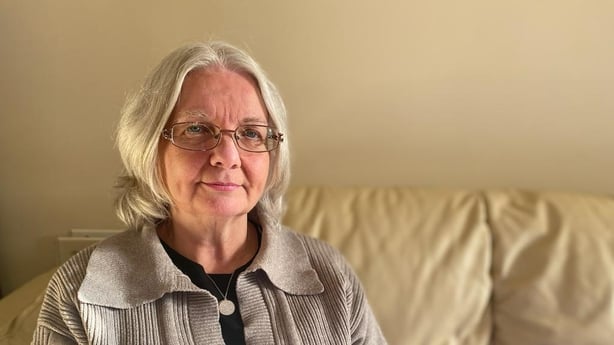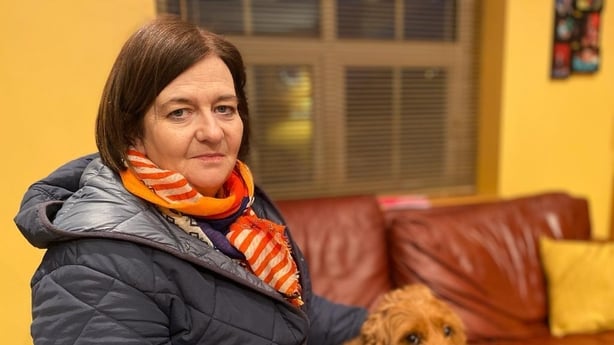People with disabilities are facing a "crisis within a crisis" in the rental market, according to some who have spoken to RTÉ’s Drivetime.
"For anyone that has a disability in the current market, it's an absolute and utter nightmare. There is absolutely no housing out there," said Ann Byrne, who is on the verge of homelessness.
She has an acquired brain injury and had a stroke, which means she often uses a wheelchair and has specific accessibility requirements.
Ms Byrne has rented a house in Wicklow with her son Conor for many years but has received an eviction notice.
She is on the list for local authority social housing, but while she waits for something suitable, she is also looking for a home in the private rental market.
"Unfortunately, part of this is that there are rental properties that come up online from time to time, but regrettably quite a number of these have turned out to be scams.

"And as I have an acquired brain injury, I find it very difficult sometimes to figure out what is real and what’s a scam, so that adds to the distress.
"There really are no rental properties out there that are suitable. If the council cannot find suitable accommodation, then I really don’t know what the answer is. I guess we will be homeless, and it will be a tent."
Ms Byrne said the voices of disabled people are not being heard in the housing crisis.
"To be fair to [the local authorities], how can they engage if they don't have the suitable housing stock? So, I wouldn't slate the local authorities.
"They all seem to be between a rock and a hard place and we're all struggling. But unfortunately, the one that ends up without a roof over my head, with continuing stress and a decline in health, is me. It is a crisis within a crisis."
Mary Lafferty-Fowley and her family live on the Isle of Doagh in Donegal. Her 15-year-old son Declan is a wheelchair user.
They are one of the thousands of homeowners in Donegal whose property has been affected by defective concrete blocks.
They hope to demolish their home and begin the rebuild later this year. Under a government grant scheme, the family can avail of 15,000 euros to help with the cost of alternative accommodation during the rebuild.
But while finding rental accommodation in Donegal is difficult at the moment, Ms Lafferty-Fowley said finding accessible property that suits her son’s needs is almost impossible.
"We're trying to think of all possible options. So, one of the options we had looked at was maybe building an annex, and Declan and myself would live there.
"One option is to move into my parents. But again, their bathroom wouldn't be suitable. So, then we'd have to look at maybe going to the local swimming pool or across the border to the swimming pool, and seeing if that has accessible showering facilities that would accommodate Declan."

Ms Lafferty-Fowley said there are accessible local authority houses in the region but does not think she would qualify for social housing.
"It's going to be a disaster and it's just sitting there waiting to happen. It'll probably be a matter of us becoming officially homeless so that something will happen, because there's nothing that we can do. This has to be dealt with by other agencies, or other supports within the system."
Elitsa Borisova has a disability and is a wheelchair user. She has been in the rental market for years and said she has plenty of experience in dealing with the lack of accessible housing.
"When you are a person with a disability, you just can’t compete on the rental market," she said.
"When you send an email – and I say this from my experience – and say you are a wheelchair user, you are never contacted."
Ms Borisova points to a range of other barriers, including limited information about a property’s accessibility on websites, and the reluctance of some landlords to accept Housing Assistance Payment.
But Ms Borisova believes the problem can be easily solved and has proposed a number of legislative changes.
"Landlords should have tax cuts when they offer accommodation to people with a disability. And HAP should go directly to the landlord, not the tenant. In this way, irresponsible tenants will not abuse the system and HAP will be directly paid to the landlord."
Ms Borisova said awareness is not the solution to the rental crisis for people with disabilities.
"It’s a public secret. Everyone is aware of this. It’s not awareness, but action that’s needed, and it must be urgent."
According to figures from the Irish Wheelchair Association, there are 5,000 people with disabilities on the waiting list for social housing, and one in four homeless people has a disability.
Jean Coleman, the housing programme manager with the IWA, said it is difficult to know the true scale of persons with disabilities struggling in the private rental market.
Ms Coleman said they are seeing an increase in members experiencing severe housing difficulty and describes it as a "hidden crisis".
She partly attributes the shortage of suitable accommodation to current building regulations in Ireland.
"From the building regulations point of view, houses or apartments need to be wheelchair visitable. This basically means that people can have access to a house and a room.
"But people aren’t building wheelchair livable housing. They don’t have to do it because of the building regulations. So until they change, I can’t really see any great improvement."
Ireland has ratified the United Nations Convention on the Rights of Persons with Disabilities, but Ms Coleman said Ireland is failing in its international obligation.
"That talks about the rights of people with disabilities to live in communities of their choice, where they want to live, in the right location.
"And while we ratified that in 2018, it hasn’t fully been adopted yet. We’re a long way from that, so we need full implementation of the UNCRPD."






